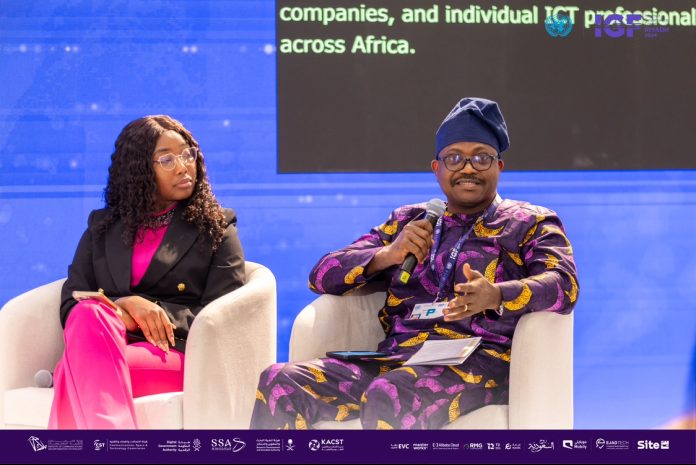African leaders and stakeholders delved into strategies to advance digital governance on the continent.
The panel discussion, themed “Digital Governance in Africa: Post-Summit of the Future,” highlighted the urgent need for inclusive digital policies, investment in infrastructure, and gender equity in technology.
Namibia’s Leadership on the Global Digital Compact
Madam Emma Theofelus, Namibia’s Minister of Information and Communication Technology (MICT),
emphasized her country’s role as a co-facilitator of the Summit of the Future and the Global Digital Compact (GDC).“Namibia carried the interests of the Global South, particularly Africa, to ensure our voices were heard in shaping the Pact of the Future,” she stated.
Madam Theofelus underscored the need for African countries to implement costed action plans to realize digital goals under the 2030 Sustainable Development Goals (SDGs) and Agenda 2063.
“Everything looks good on paper, but without a costed implementation plan, it’s all talk. Each country must allocate resources—$2 million annually, for instance—to achieve these objectives,” she said, calling for stronger collaboration with international organizations such as the World Bank, UNESCO, and UNDP.
She also highlighted the interconnectedness of energy and ICT infrastructure. “You can’t connect people if they are in the dark. Network infrastructure won’t function without energy. This multi-faceted issue requires a comprehensive approach.”
Private Sector’s Role in Bridging the Digital Divide
Dr. Jimson Olufuye, Chair of the Advisory Council for the Africa ICT Alliance (AfICTA), reiterated the private sector’s critical role in driving digital transformation. “The private sector is ready to implement affordable solutions, but we need meaningful participation and government support,” he noted.
Dr. Olufuye advocated for the adoption of Universal Service Provision Funds (USPF) to subsidize infrastructure in underserved areas. “Subsidies are essential for bridging the connectivity gap, especially in rural areas where access remains below 25% in countries like Nigeria,” he explained.
He also called for inclusive dialogue among stakeholders, emphasizing the need for buy-in from all sectors. “We must bring everyone—government, private sector, gender advocates, and civil society—to the table to ensure no one is left behind.”
Addressing the Gender Digital Divide
When asked about Namibia’s strategy to connect more women and girls, Minister Theofelus highlighted systemic barriers limiting women’s participation in tech. “Cultural, religious, and normative barriers make it difficult for girls to pursue careers in technology,” she remarked. “Only 25% of the global tech workforce is women, and only 11% are executives in tech companies.”
Namibia has taken proactive steps to close this gap. “We organize girl coding camps and have developed a national digital literacy framework to ensure quality training across the country,” she explained. The ICT Ministry has also established ICT centers in rural areas, providing access to basic technology and training.
Theofelus stressed the importance of digital literacy, saying, “Let’s get back to basics. If the average person in our communities can’t confidently go online, all our high-level discussions mean nothing. Empowering people with basic digital skills will drive demand and force governments and the private sector to expand services.”
A Call to Action
The panelists concluded with a unified call for action, urging African governments to prioritize digital governance as a cornerstone of development.
“ICT is no longer just a sector; it’s the backbone of every other sector,” Theofelus stated, reflecting on Namibia’s ICT sector growth during the COVID-19 pandemic. “It carried other sectors when they were brought to their knees.”
With robust collaboration among governments, the private sector, and international organizations, Africa can bridge its digital divide and achieve sustainable development through inclusive digital governance.










